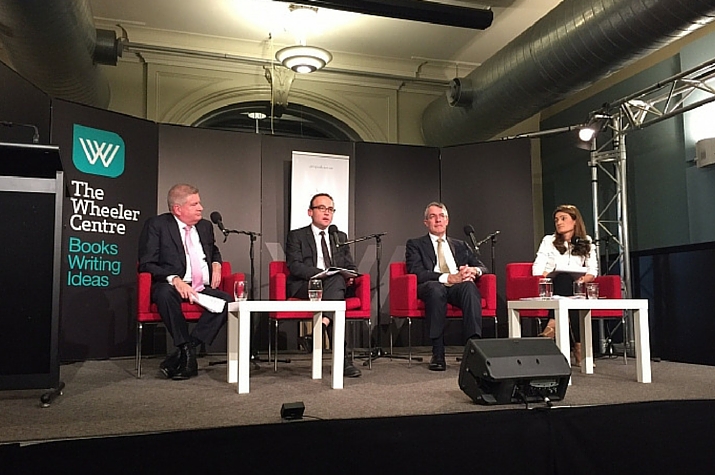Election half-time report: Coalition arts policy goes missing

At the National Arts Debate in Melbourne were the Liberals’ Mitch Fifield, the Greens’ Adam Bandt, Labor’s Mark Dreyfus, and moderator Patricia Karvelas. Photo: Twitter/Esther Anatolitis
The 2016 federal election campaign has reached the halfway point on the way to polling day on July 2, and some significant policy announcements have now been made about the arts.
Labor and the Greens have released most of their arts policy, and both parties have pledged to fully restore funding to the Australia Council following the stripping of $105 million in the 2015 federal Budget (which was later reduced to $73 million following the protests of last year).
Labor would also abolish the new Catalyst fund and redirect that money to the Australia Council, along with an extra $20 million a year.
Additionally, under Labor, the ABC would receive an extra $60 million to produce an estimated 30 hours of local drama a year.
Other elements of the Labor arts platform include an $8 million boost to the regional arts fund focus on artistic skills development among disadvantaged communities, Aboriginal and Torres Strait Islander communities, and isolated towns, and $2 million a year to expand school music programs.
Labor’s arts spokesman, Mark Dreyfus, says the party’s policy commitments to date are worth $138.5 million, with expectations that there could be one more announcement before the election.
Speaking at the National Election Arts Debate in Melbourne last week, Mr Dreyfus said arts would be central to a Shorten government.
“Visual arts, film, theatre and dance all contribute to economic activity,” he said.
Caring for the arts and culture
The Greens have valued their arts policy at $270.2 million, including restoring the full amount of funding cut from the Australia Council.
Other initiatives would include an additional $3 million to the ArtStart program, $20 million to artists whose works are publicly displayed, and creating an Arts Research and Development grants program to encourage innovative arts projects with an initial funding allocation of $5 million over the next four years.
Greens arts spokesman Adam Bandt has also proposed an ‘arts for the dole’ scheme, where artists could continue to receive Centrelink payments if their earnings from their art were below a certain threshold.
“It’s time we care for our arts sector so arts and culture can care for us,” Mr Bandt said at the arts debate.
“Ultimately on election day, voters will need to judge the parties by both their past actions and by the substance of what they would do in the future.”
— MEAA Equity director Zoe Angus
The newly-formed Arts Party also has a comprehensive suite of policies, including the reversal of all cuts not just to the Australia Council but other national institutions. The Arts Party will be running Senate candidates in each state except Northern Territory and the ACT, along with six lower house candidates.
But missing in action has been a policy from the Coalition government.
Most people had expected some kind of policy announcement from Arts Minister Mitch Fifield at last week’s debate, but none was forthcoming.
Instead, Senator Fifield said he was “absolutely committed” to the existing architecture of the arts and wanted to consult more with the arts sector to bring the arts into the Coalition’s innovation agenda.
“If we really want to an innovative economy and society, we need to include creative endeavours,” he said.
‘Healthy debate’
MEAA has sent to the major parties and key independents its own federal election policy paper outlining much-needed funding and policy reforms to help return the arts sector to a stable and productive path.
“For as long as these cuts are sustained and budgets not restored, this vital economic and cultural sector will wither and with it, the ability to maintain important cultural endeavours and enable the next generation of talented Australians to reach their potential, will be severely compromised,” the paper says.
Key asks include:
• Restoring Australia Council funding to 2013-14 levels, abolishing the Catalyst fund and return that money to Australia Council grants programs.
• Restoring Screen Australia funding to 2013-14 levels ($100 million) beginning in 2016-17.
• A uniform 40% producer offset across all formats, including film and television.
• Increasing the location offset from 16.5% to 30% to attract major international screen productions to Australia.
MEAA Equity director Zoe Angus said the election debate about the arts is healthy, but it was disappointing that the Coalition had not put forward a policy on which it could be judged.
“Senator Fifield was so evasive on this issue that it appears the Coalition will not have an arts policy and is missing in action,” she said after the arts debate.
“All Senator Fifield had to say today was a growing and prosperous economy would provide an environment for innovative arts and cultural industries. This type of trickle down economics is no substitute for a real arts funding policy.
“If it is to be the case that the Coalition will not unveil a policy, it would be another significant let down for Australia’s performing arts and screen sectors following the cuts to funding for the Australia Council and Screen Australia over the past two years. . . Ultimately on election day, voters will need to judge the parties by both their past actions and by the substance of what they would do in the future.”